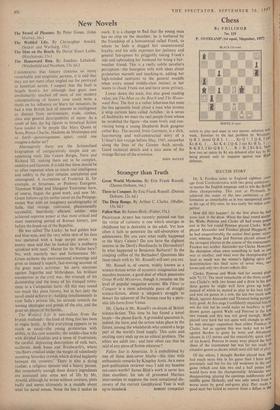New Novels
The Sword of Pleasure. By Peter Green. (John M urray, 16s.) The Man on the Beach. By David Stuart Leslie. (Hutchinson, 15s.) The Homeward Run. By Joachim Lehnhoff. (Weidenfeld and Nicolson, 13s. 6d.)
CONSIDERING that history contains so many remarkable and enigmatic persons, it is odd that they are not more often singled out for portrayal in historical novels. I suspect that the fault is largely Scott's; for although that great man involuntarily touched off most of our modern conceptualising of history (one could write a thesis on his influence on Marx for instance), he had a true British lack of interest in intelligence as distinct from environment, trade, clothes, class and general descriptability of status. As a result of him the big figures in historical fiction have tended to be people like Mary Queen of Scots, Prince Charlie, Madame de Montespan and so forth—picturesqueness apart, could one imagine a duller set?
Alternatively there are the fictionalised biographies of comparatively simple and un- appetising souls like Cesare Borgia, Nero and Richard III, making them out to be complex, sensitive and hUmane. It is odd that these should be so often repeated when so much real intelligence and oddity in the past remains unexplored and unimagined. A re-creation of Frederick II, for example, or Struensee, or Ptolemy Euergetes. Thornton Wilder and Margaret Yourcenar have, of course, begun the good work, and now Mr. Green follows up his earlier novel on the Pelopop- nesian War with an imaginary autobiography of Sulla, that strange, cultivated, phenomenally successful, heartlessly efficient soldier who achieved supreme power at that most critical and most interesting period of Roman history, just before the break-up of the Republic.
He was called The Lucky; he had golden hair and blue eyes, and the very white skin of his face was spattered with a huge purple noevus : an enemy once said that he looked like 'a mulberry sprinkled with meal.' Matter for Sir Walter here? No, with masterly tact and forbearance Mr. Green eschews the environmental trimmings and gives us instead a superb, fast-moving account of the great man's activities : his early successes against Jugurtha and Mithridates, his brilliant manoeuvres in the civil war, the triumph of his dictatorship and the irony of his tranquil retire- ment to a Campanian farm. All this may sound too much like plain history, but in fact only the novel could achieve it—holding simultaneously in view Sulla's private life, his attitude towards the waning ideologies and greeds of the city, and the great set-pieces of the battles.
The Wedded Life is neo-realism from the brutish midlands : the kind of thing that has been in vogue lately. At first everything appears to be much as usual—the young proletarian with ability, in this case scientific; the middle-class wife with divided loyalties and a sense of frustration; the careful, depressing descriptions of milk bars, sculleries, dank buses and Woolworth's, where 'the floors creaked under the weight of relentlessly mooning Saturday crowds which drifted haplessly between the counters.' There is also a dying mother, a religious spinster and a hearty parson. But remarkably enough these dreary ingredients are animated into some sort of life by Mr. Arnold, although he writes without sureness, plots badly and seems ultimately in a muddle about what his novel means. None the less it makes its mark. It is a change to find that the young man has no chip on the shoulder; he is bothered. by the friendship of a homosexual called Frank, to whom he feels a dogged but unsentimental loyalty, and his wife expresses her jealousy and general fed-upness by priggishly taking Frank's side and upbraiding her husband for being a fair- weather friend. This is a really subtle novelist's perception—the bourgeois wife with ideas about proletarian warmth and mucking-in, adding her high-minded tantrums to the general muddle when every sound middle-class instinct in her wants to chuck Frank out and have some privacy.
Lower down the scale, but also good reading value, are The Man on the Beach and The Home- ward Run. The first is a rather laborious but none the less agreeable book about a man who invents a strip cartoon hero called Achilles : in a series of flashbacks we meet the real people from whom he modelled the figure—the most lively and con- vincing being a young Shepherds Bush gangster called Ray. The second, from Germany, is a slick, fast-moving and well-constructed story of a U-boat's last voyage before May, 1945, somewhat along the lines of the Gunner Asch novels. Good technical details and a nice sense of the strange flavour of the armistice.
, JOHN BAYLEY






























 Previous page
Previous page